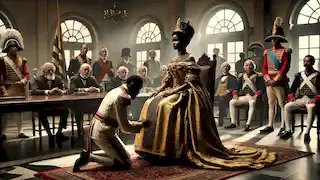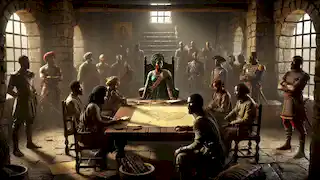The fierce winds swept across the dense forests and vast plains of Ndongo and Matamba, present-day Angola. In the heart of these lands, a singular figure stood out in history – a woman whose name has echoed through the centuries, inspiring generations with her unparalleled courage, wisdom, and determination. This is the story of Queen Nzinga, the legendary warrior queen who stood against Portuguese colonization and fought for the freedom of her people.
Born into the royal family of the Ndongo kingdom in the late 16th century, Nzinga Mbande was destined for greatness from the very start. Her father, King Kiluanji Kia Samba, had ruled over the lands of Ndongo, often finding himself in conflict with the growing Portuguese colonial presence. The Portuguese, seeking slaves and resources, increasingly encroached upon the kingdoms of Central Africa, leaving devastation in their wake. As a child, Nzinga was keenly aware of the political turmoil and threats her people faced, and this awareness would shape the woman she would become. Nzinga's childhood was anything but ordinary. She grew up amidst political intrigue and warfare, learning the skills of diplomacy and combat from her father. However, unlike most women of her time, she was not restricted to the traditional roles expected of her gender. Her father recognized her intelligence, strength, and tactical mind, often allowing her to sit in on political discussions and decisions. This exposure to governance and military strategy would later serve her well in her fight against the Portuguese invaders. Her brother, Ngola Mbande, ascended to the throne after their father’s death, but his rule was marked by instability. The Portuguese had established a foothold in the region, demanding tribute and slaves from the local kingdoms. Tensions were high, and the situation was volatile. Seeing the dire situation her brother faced, Nzinga stepped in as his advisor, quickly making a name for herself as a skilled diplomat and strategist. In 1622, a crucial moment came when her brother sent her as an emissary to negotiate with the Portuguese governor, João Correia de Sousa. The governor underestimated Nzinga, assuming that a woman could not possibly be a formidable negotiator. He attempted to humiliate her by refusing to offer her a chair during the meeting, leaving her to either stand or sit on the ground. Undeterred, Nzinga ordered one of her servants to kneel and offered her own back as a seat. This act of defiance became legendary, symbolizing her refusal to bow to colonial arrogance and her determination to meet the Portuguese on equal footing. Shortly after the negotiations, her brother Ngola Mbande died, some say by suicide, while others speculate that Nzinga may have had a hand in his death. Regardless, Nzinga assumed the throne, becoming Queen of Ndongo and Matamba. Her rise to power was fraught with challenges. She had to solidify her position as a female ruler in a patriarchal society while simultaneously contending with the increasing threat posed by the Portuguese. One of Nzinga’s first acts as queen was to forge strategic alliances. She understood that to effectively resist the Portuguese, she would need allies both within and outside her kingdom. She reached out to the Dutch, who were also vying for control in the region and had their own conflicts with the Portuguese. Nzinga's ability to navigate the complex web of colonial politics and local tribal dynamics was nothing short of masterful. She used diplomacy, military strategy, and even religion to strengthen her position. In a remarkable political move, she converted to Christianity, taking the name Dona Ana de Sousa, after the Portuguese governor’s wife, though many believe this was a strategic decision to gain favor rather than a genuine conversion. Despite her efforts at diplomacy, the Portuguese continued their aggression, seeking to enslave her people and expand their control over Central Africa. Nzinga was forced to take up arms. She led her army into battle, donning armor and wielding weapons herself. She was not merely a figurehead but a true warrior queen, fighting alongside her soldiers and inspiring them with her bravery and tactical brilliance. For years, Nzinga waged a guerrilla war against the Portuguese. She used the rugged terrain of her homeland to her advantage, conducting surprise attacks and evading capture. Her tactics frustrated the Portuguese, who had assumed they would easily crush her forces. Time and again, Nzinga's army, composed of fiercely loyal warriors, inflicted significant damage on Portuguese forces. Nzinga’s most famous act of defiance came when she relocated her capital to the island of Kindonga, which was protected by rivers and swamps, making it nearly impossible for the Portuguese to penetrate. From this stronghold, she launched raids on Portuguese settlements, freeing enslaved Africans and reclaiming territory. Her leadership was relentless, and despite the odds, she managed to sustain her resistance for decades. Throughout her reign, Nzinga continued to demonstrate her diplomatic acumen. When alliances shifted, she adapted. She formed alliances with neighboring kingdoms and even adopted orphaned children from defeated enemies, integrating them into her court to ensure loyalty. She was a ruler who balanced compassion with strength, strategy with bravery. Nzinga’s struggle for freedom extended far beyond her own lifetime. Though she would eventually enter into negotiations with the Portuguese, the resistance she led inspired countless others to continue the fight. She lived to the age of 81, an extraordinary feat in an era where life expectancy was short, particularly for those in the midst of constant warfare. Even in her later years, she remained active in governance, ensuring that her people would continue to resist colonization long after her death. Nzinga's legacy is one of resilience, strength, and unwavering commitment to her people’s freedom. Her story has become a symbol of resistance not only in Angola but across Africa and the African diaspora. Her name is spoken with reverence by those who continue to fight for justice and freedom in the face of oppression. Her kingdom eventually fell to Portuguese control after her death, but her influence did not end there. Nzinga’s life and legacy have been immortalized in oral traditions, songs, and literature. In Angola, she is celebrated as a national hero, and her story continues to inspire movements for freedom and independence worldwide. Queen Nzinga’s impact went beyond the borders of her kingdom. As news of her defiance spread, she became a symbol of African resistance to European colonization. Her ability to lead her people, outwit colonial forces, and maintain independence for so many years made her a legend in her time. She is often compared to other great African leaders such as Shaka Zulu and Haile Selassie, but what sets Nzinga apart is her role as a woman in a deeply patriarchal society. Her achievements shattered the gender norms of her era, proving that leadership and strength know no gender. Her military tactics are still studied today by scholars of African history and military strategy. Nzinga’s use of guerrilla warfare, strategic retreats, and psychological warfare were ahead of her time, showcasing a deep understanding of both traditional African warfare and European military tactics. She knew when to fight and when to negotiate, always keeping the survival and freedom of her people as her ultimate goal. Nzinga also left a lasting impact on the cultural and social structure of her kingdom. She was a visionary leader who worked to dismantle the internal slave trade within her territories. She understood that the only way to resist the external threat of colonization was to unite her people and put an end to internal divisions that weakened them. Her policies promoted equality, and she worked to elevate the status of women within her society, allowing them to hold military and political positions. Today, Queen Nzinga is remembered not just as a warrior, but as a mother of her nation. Her legacy is a reminder of the power of determination and the importance of standing up for what is right, no matter the odds. In Angola, her memory is honored with statues, schools, and institutions bearing her name. Her story is told to children as a source of pride and inspiration, a beacon of what it means to fight for freedom. Outside of Angola, Nzinga’s legacy continues to grow. She has become a symbol of black empowerment and feminist strength. Her story is taught in African history courses around the world, and her life has been the subject of plays, films, and books. Queen Nzinga's defiance of colonialism has made her an enduring symbol of resistance against oppression. Her name is invoked by freedom fighters and activists around the globe, reminding us all that the spirit of Nzinga lives on wherever people fight for justice. Her story stands as a testament to the resilience of African cultures in the face of colonialism and as a reminder that true power lies not in domination, but in the unwavering commitment to the freedom and dignity of one’s people. As we reflect on her incredible journey, it becomes clear that Queen Nzinga was not just a leader of her time, but a figure for all time – a warrior, a diplomat, and a queen whose influence spans centuries. Her legacy, rich with lessons of courage, resistance, and leadership, continues to inspire those who seek freedom, justice, and equality in the world today.The Birth of a Leader
Queen Nzinga Takes the Throne

Resistance and Rebellion
The Queen’s Legacy

A Symbol of African Resistance

The Legend Lives On


















